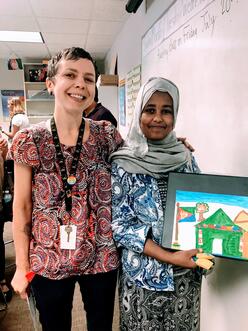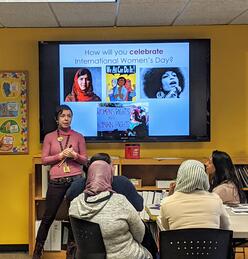
The International Rescue Committee's (IRC) response to the COVID-19 pandemic, both globally and in the U.S., is grounded in decades of experience in managing multi-faceted health outbreaks and emergencies. From that experience, evidence has proven that supporting the resilience of our frontline staff directly translates to supporting the wellbeing of the IRC’s clients.
While the term “frontline worker” might initially conjure images of healthcare professionals like nurses and doctors, there are countless other staff within the IRC that are also on the frontlines, working directly to provide and connect clients with vital services. They are social caseworkers, mental health specialists, food security experts, childcare specialists, teachers, among many others. These frontline workers have been critical in the IRC’s response throughout the COVID-19 pandemic, and it’s important that we provide all of them with tools to maintain their own wellbeing and mental health.
Recognizing this need, earlier this year the IRC joined forces with #FirstRespondersFirst – an initiative of Harvard T.H. Chan School of Public Health, Thrive Global, and the CAA Foundation – and #FirstRespondersFirst’s strategic partner Johnson & Johnson to prioritize the well-being and mental health of IRC staff. Through this partnership, the IRC has been able to expand its investment in staff care resources across U.S. offices.
Wende is one of the IRC’s frontline workers based in Atlanta, who has been with the IRC for nine years, working with clients as an education specialist teaching English and employment readiness classes. Through #FirstRespondersFirst, Wende participates in staff-care groups which will increase knowledge of effective self-care strategies, and build supportive networks among frontline workers.

How has the pandemic affected your job? How have you had to adjust your services/work for clients?
The first five months were incredibly depressing because we couldn’t reach people, and we couldn’t reach students, and we had the struggle of teaching students online how to access education remotely. It was really hard getting it going, in addition to completely rewriting the curriculum.
What are the most pressing concerns that IRC clients are expressing about the pandemic?
Food insecurity is always an issue, but it increased during the pandemic. Clients lost jobs or had hours reduced at work, in addition to the isolation and the feeling of not being safe. People had a hard time understanding what the rules and restrictions were. It was especially hard for those waiting for family reunification and having things delayed because it wasn’t safe to fly. After seeing years of refugee arrivals drop even further, it was pretty devastating for everyone. Specifically for women, a huge challenge was their kids being home all the time. We even had a couple of our clients come to classes with their children.
Amazingly though, our clients still attended IRC programs, despite the challenges of work, doctor’s appointments, and staying healthy.
Their resilience blows me away – they’ve all had massive challenges that everyone else has had, but some are still going to IRC classes virtually while in a van on the way to work, or while simultaneously looking after their kids.
What were your initial thoughts about this program when you first learned about it?
I was really pleased to see that the IRC was taking something like that on, and really caring about staff. Anything that involves care is part of my nature – I’m a caregiver, and I’m a teacher. So it’s really exciting, and having the experience and knowledge I have, I want to both share my skills and learn more.
What are you hoping to get out of the program?
I’m hoping to learn and be able to provide feedback to the program. An important part of being a first responder is being part of a community, and part of a team, and support only coming from the top down is not going to be effective. So, I want to be part of that – and I want to learn, I want to take what I learn back to what I do with IRC clients, and hopefully create impact – however small or big it may be.
About #FirstRespondersFirst
#FirstRespondersFirst, an initiative of Harvard T.H. Chan School of Public Health, Thrive Global, and the CAA Foundation, takes a whole human approach to addressing the needs of frontline workers in order to support their ability to serve on the frontlines of the COVID-19 pandemic. #FirstRespondersFirst’s fundraising call to action helps provide essential supplies, protective equipment, accommodations, child care, food, and critical mental health support and resources to ensure that our frontline workforce is protected, well-supported and resilient. Learn more about the #FirstRespondersFirst initiative here.